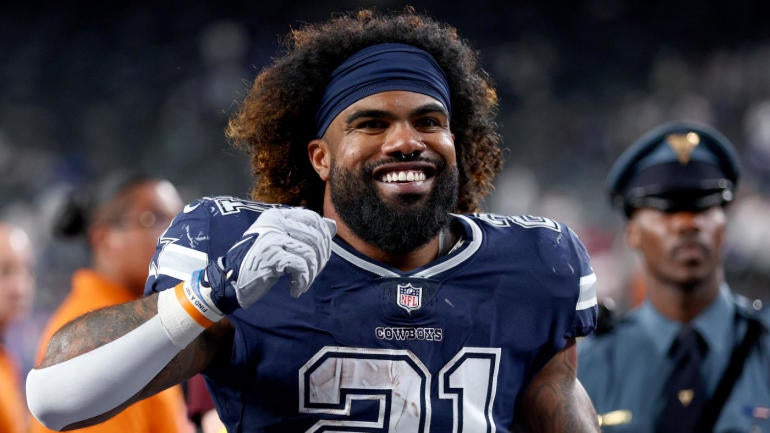
Ezekiel Elliott and Tony Pollard formed arguably the NFL's best running back tandem this season. The duo may be headed for a break up. Pollard, who suffered a high ankle sprain and broken left fibula in the Cowboys' season ending 19-12 loss to the 49ers in the divisional playoffs, is an unrestricted free agent.
Elliott isn't earning his keep. He has been trending in the wrong direction statistically since becoming the first running back in the league history to sign a $100 million contract. The two-time rushing champion signed a six-year, $90 million contract extension, which made him the NFL's highest paid running back at $15 million per year, shortly before the start of the 2019 regular season to end a lengthy preseason holdout. Elliott, who had two years remaining on his rookie contact, established new standards for running backs with $50,052,137 in overall guarantees and $28,052,137 fully guaranteed at signing with deal.
The 2022 season was the worst of Elliott's seven-year NFL career. He had 231 rushing attempts for 876 rushing yards with 3.8 yards per carry, all career lows. He caught 17 passes for 92 yards, which were more career worsts.
Elliott also averaged a career low 58.4 rushing yards per game. Prior to Elliott getting his extension, he averaged 101.2 rushing yards per game.

With The First Pick Newsletter
With The First Pick Newsletter
Prepare for the upcoming NFL Draft with the day’s big stories + mock drafts, big board updates and more.
Thanks for signing up!
Keep an eye on your inbox.
Sorry!
There was an error processing your subscription.
Pollard was Dallas' most consistent and effective running back. He earned his first Pro Bowl berth by rushing for 1,007 yards while averaging 5.2 yards per carry, which was third in the NFL among running backs. This was Pollard's first 1,000 yard rushing season.
Pollard is a prime candidate for a franchise designation despite the injury. The non-exclusive franchise tag for running backs projects to 4.489% of salary cap. If the 2023 salary cap is set at $225 million, the running back number should be $10.1 million.
Elliott is scheduled to make $10.9 million in 2023 on a $16.72 million cap number. He has 2023's second largest cap hit for a running back.
Teams rarely make a significant financial investment in two running backs simultaneously. Pollard can certainly be retained long term for less than the $52.9 million in the final four years of Elliott's contract running from 2023 through 2026.
A close look at Elliott's salary
Elliott's salary, cap figure and declining production have put his roster spot in serious jeopardy regardless of what happens with Pollard. The Cowboys would have $11.86 million of dead money, a salary cap charge for a player no longer on a team's roster, and $4.86 million in cap savings by releasing Elliott in a conventional manner. That's without using a Post-June 1 designation.
In a release with a Post-June 1 designation, the Cowboys would be required to carry Elliott's full $16.72 million cap number until June 2 even though he would no longer be a part of the roster. Elliott's $10.9 million salary, the 2023 cap savings, would come off Dallas' books at that time.
Only the current year's bonus proration counts toward the cap for players released with a Post-June 1 designation. The acceleration of the bonus proration in future contract years is delayed until the following league year, which typically begins in early to mid-March. The dead money would be taken over two years with $5.82 million in 2023 and $6.04 million in 2024 instead of all $11.86 million during the 2023 league year.
Elliott is reportedly open to taking a pay cut to remain with the Cowboys. "I want to be here," he said after the playoff loss to the 49ers. "I don't have a crystal ball; I can't tell you the future. But I definitely want to be here."
A recent blueprint of what might work: David Johnson
The only way the Cowboys should consider entertaining an Elliott pay cut is with more cap room being gained than through a conventional release. This means that Elliott's 2023 salary would have to drop from $10.9 million to below $6.04 million.
The only recent example of a high priced running back taking a pay cut is David Johnson with the Texans in 2021. Johnson was expected to be the focal point of the Texans' offense after being acquired in a 2020 offseason trade which sent All-Pro wide receiver DeAndre Hopkins to the Cardinals.
Johnson had previously signed a three-year, $39 million extension (worth a maximum of $45 million through incentives) with $31,882,500 of guarantees hours before the Cardinals' 2018 regular season opener. He fell out of favor with the Cardinals during the 2019 season after Kenyan Drake was acquired as the trading deadline was approaching.
Johnson couldn't resurrect his career with a change of scenery. He rushed for 691 yards in 12 games and caught 33 passes for 314 yards to total 1,005 yards from scrimmage (combined rushing and receiving yards) during his first season in Houston. It was a far cry from Johnson's last highly productive season in 2016, when he led the NFL with 2,118 yards from scrimmage and 20 touchdowns.
Johnson reduced his 2021 compensation from $9 million to $5 million where $4.25 million was fully guaranteed in what was the final year of his contract. He had the ability to earn back $1 million through incentives based on his offensive playtime and yards from scrimmage during the 2021 season.
Elliott taking a pay cut to the same $5 million as Johnson would be nearly a 55% decrease. His new 2023 cap number of $10.82 million would provide $5.9 million of cap relief with a straight salary reduction. All or most of the $5 million would need to be fully guaranteed. This could be accomplished by making $3.75 million a roster bonus due several days after signing the new contract, where the remaining $1.25 million would be fully guaranteed base salary.
More 2023 cap room would be gained with Dallas willing to add $2,812,500 to the dead money when Elliott is eventually released in the future by making the $3.75 million a signing bonus that's prorated on the salary cap at $937,500 annually from 2023 through 2026 instead. Elliott's cap number would be $8,007,500 consisting of his new $1.25 million base salary, $5.82 million in pre-existing bonus proration and $937,500 in new bonus proration. Dallas would clear $8,712,500 of 2023 cap room this way.
Most players want an opportunity to earn back all of the money lost with a pay cut through incentives. For Elliott to be made whole, he would need to perform like he did in the first season after signing his new deal when he was fourth in the NFL with 1,357 rushing yards, had 14 total touchdowns (fifth in the league) and was selected to the Pro Bowl for the third and final time of his career.
What the Cowboys should do
The Cowboys moving on from running backs coach Skip Peete, whose contract will not be renewed, may not bode well for Elliott's pay cut prospects since the two are believed to be close. The most prudent thing for the Cowboys to do would be to part ways with Elliott. Dallas has seemingly reached a point of diminishing returns with him.
Cowboys owner Jerry Jones curiously proclaimed, "We go as Zeke goes" during the middle of the season. Elliott's best chance for an eighth season in Dallas is if Jones still sincerely believes there's some truth in that statement.





















